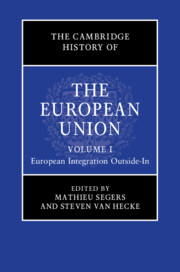Book contents
- The Cambridge History of the European Union
- The Cambridge History of the European Union
- The Cambridge History of the European Union
- Copyright page
- Contents
- Figures
- Contributors to Volume I
- Acknowledgements
- Abbreviations
- Reflections on the History and Historiography of European Integration
- Part I Critical Junctures
- Part II Multilateralism and Geopolitics
- Part III Perspectives and Ideas
- Networks and Attitudes
- Thinking and Memory
- Culture and Religion
- 24 European Culture(s)
- 25 The Catholic Narrative of European Integration
- 26 European Integration and the Churches
- Index
- References
25 - The Catholic Narrative of European Integration
from Culture and Religion
Published online by Cambridge University Press: 21 October 2023
- The Cambridge History of the European Union
- The Cambridge History of the European Union
- The Cambridge History of the European Union
- Copyright page
- Contents
- Figures
- Contributors to Volume I
- Acknowledgements
- Abbreviations
- Reflections on the History and Historiography of European Integration
- Part I Critical Junctures
- Part II Multilateralism and Geopolitics
- Part III Perspectives and Ideas
- Networks and Attitudes
- Thinking and Memory
- Culture and Religion
- 24 European Culture(s)
- 25 The Catholic Narrative of European Integration
- 26 European Integration and the Churches
- Index
- References
Summary
The multilateral regional system built in post-war western Europe became the world’s most robust and integrated such system, both economically and politically. This chapter proposes that the birth, development and sustainability of European integration that occurred in the period spanning from the late 1940s to 1989 benefited from a synthesis of Christian, nationalist and liberal ideas, and that this synthesis underscored the emergence of European integration and legitimated its development in the four decades of the Cold War.
The synthesis describing Europe’s regime and historical evolution – termed here the ‘Catholic narrative’ – served as the analytical and prescriptive basis for the generation of Christian Democrats that played a crucial role in the reconstruction of the democratic order after the Second World War. To add to the understanding of the history of post-war Europe, this chapter describes the emergence of this synthesis in the early days of the Cold War, its consolidation in the four decades that followed, its demise after 1989 and the reconfiguration it has undergone since 2015. The specific religious origins of the post-war Catholic narrative are uncovered, and its functions in the context of the emerging bipolar system are established. In a historical moment when political actors were in dire need of innovative solutions to overcome Europe’s security dilemma, the Catholic Church set the ground for new avenues of action by using its narrative power to rally liberal, religious and nationalist identities to counter the communist threat.
- Type
- Chapter
- Information
- The Cambridge History of the European Union , pp. 632 - 658Publisher: Cambridge University PressPrint publication year: 2023



